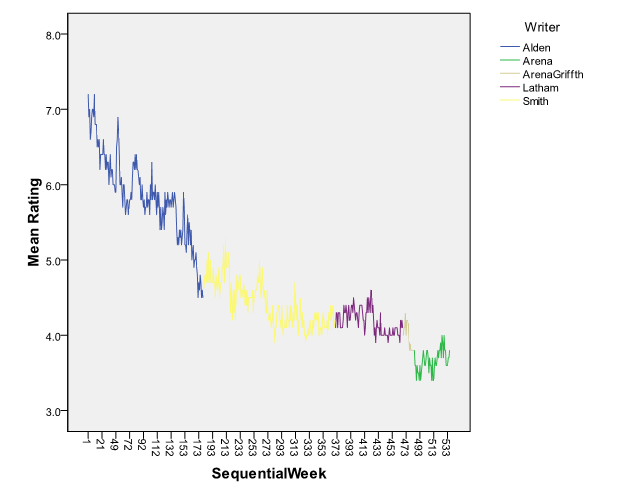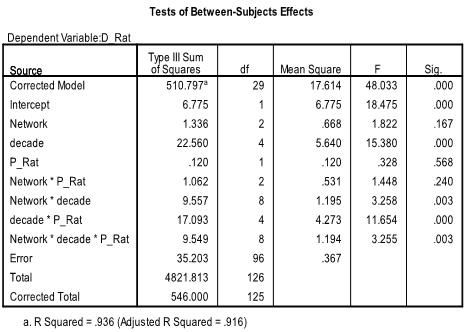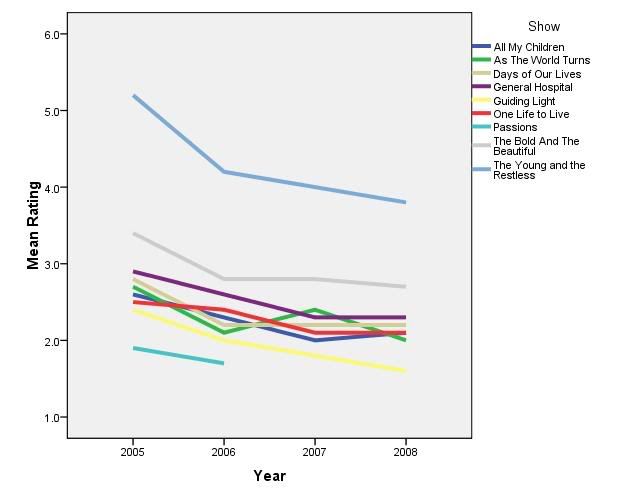ETA. SON User Paul Raven was able to give me 1999 ratings, which fleshes out data for Kay Alden. The pattern of data was identical to what I had published in an earlier draft, but it gives me more confidence in the Alden results.

Last week at Daytime Confidential, writer Jamey Giddens wrote an eloquent review of Tom Casiello's first breakdown at Y&R. It was a terrific review, and I agree with almost all of it.
But a funny thing happened in the comment thread. Jamey and a user named Monamis got into a debate about the relative impact of Lynn Latham on the ratings. Monamis points out things really went south with current headwriter (HW) Maria Arena Bell took over, but Jamey Giddens argues that Latham lost a million viewers.
What is the truth? Well, it sounds like a data analysis, and that's my thing.
Here is what I did. I wanted to go back to the start of Kay Alden's regime as solo Headwriter, but Toups' ratings archive at Soap Opera Network only gives me weekly ratings as far back as 2000. Okay, I'd start there.
Because different tenures lasted different periods of time, I thought I should post average weekly changes. These represent the slope coefficients that result when the household (HH) ratings are regressed on week. They represent the single best way to express ratings change in a common metric, despite the varying writing tenures on the show.
The figure at the top illustrates the data graphically. You can see that, as always, there was a lot of week to week variability. So, I am just extracting the linear trends from these data.
I divided the tenures this way:
Alden = Alden solo, before the arrival of Jack Smith
Smith = any period after Smith returned to the show, but before Latham joined
Latham = any period after she was formally named HW, even while Alden and Smith were still there
ArenaBell&Griffith = the disastrous (for ratings) period that began with the WGA writer's strike of 2007, and continued until Griffith's ouster in early 2008
ArenaBell = the post-Griffith period, in which she led a team that included Hogan Sheffer, Scott Hamner, and mahy others.
I further broke Latham's tenure into two pieces. 2006 was when she still had the legacy team (Alden, Smith, Ed Scott and many others) for most of it, and 2007, when she essentially had absolute control over her team without any "legacy" interference.
The table looks like this:
| HW regime | Average weekly HH ratings change |
| Kay Alden | -0.010 |
| Jack Smith with Kay Alden | -0.004 |
| Lynn Latham (overall) | -0.003 |
| Lynn Latham (2006 with legacy team) | +0.001 |
| Lynn Latham (2007 without legacy team) | -0.006 |
| Arena Bell/Griffth | -0.028 |
| Arena Bell | +0.004 |
What do these numbers show?
It means the worst regime for the show was that Arena Bell/Griffth collaboration, that coincided with the WGA writer's strike and the sudde dismissal of Lynn Latham. Story-wise, the rushed introduction of Sabrina and her whirlwind romance with Victor seems to caused so much disgust that viewers tuned out in droves.
Alden's solo regime was next in problematic ratings. On average, she lost about 0.5 HH ratings points a year, which is a lot.
What that means is that the most disastrous period in the Toups/SON ratings archive is the several month period in which Arena Bell was writing with Josh Griffith. During this period, which encompassed the writer's strike and brief period thereafter, there were non-trivial declines on a week-by-week basis. "Bleeding". Many internet bloggers/message boarders blame this on the "damaged ground" that these writers inherited from Latham, but the descent was so precipitous, I have to believe that the introduction the much-younger Sabrina and Victor's whirlwind romance with her provoked a "disgust" response that led to massive tuneout.
More impressive is that in the time since Griffith left, Arena has actually stemmed the bleeding, and she is the only HW since Bill Bell to show ratings GROWTH.Now the growth is actually fairly anemic (.004 HH ratings points per week, on average), but in this climate, any growth is breath-taking.
Ratings-wise, the second-most difficult period in the post-Bell era was Kay Alden's solo regime, at least in the period beginning with 2000. Every ten weeks, on average, the show could be expected to lose 0.1 ratings points, or about 0.5 ratings points a year.
It seems that Alden's collaboration with Smith stemmed the tide...during this period, a much slower rate of decline set in.
And here is where it gets interesting. Latham was brough into shake things up. But, overall, her weekly rate of ratings decline (-.003) was only trivially different from the Smith & Alden era. She was not any more destructive to the ratings than her predecessors, but she was also not helpful. The truth, of course, is that Latham's era can be broken into "early Latham" and "late Latham", with these distinguished by when she had Alden/Smith/Scott around and when she didn't. If you compare these periods (roughly delimited by 2006 versus 2007), you find this:
In 2006, Latham and the legacy team achieved a weekly ratings change, on average of +.001...or slight gain. But in 2007, when Latham was solo (i.e., no legacy team) her ratings changed, on average, to a weekly decline of -.006!
Thus, Latham-solo was almost as negative as Alden solo.
Jack Smith's addition did stem the flow, and the rate of decline was much slower...but continuous. Interestingly, overall, Latham's weekly rate of decline was almost identical to Smith's, even though she was brought in to "fix things up". Ironically, a closer examination shows that when she worked with Alden/Smith and other legacy team members, she was actually experiencing slight ratings gain. But, once she let go of the team, her solo rate of decline was actually almost twice as bad as that experienced by Jack Smith.
The optimistic closer, of course, is Maria Arena Bell's current trend, which is actually positive. There has been a slow but steady very slight ratings gain. A little hope for the future....















